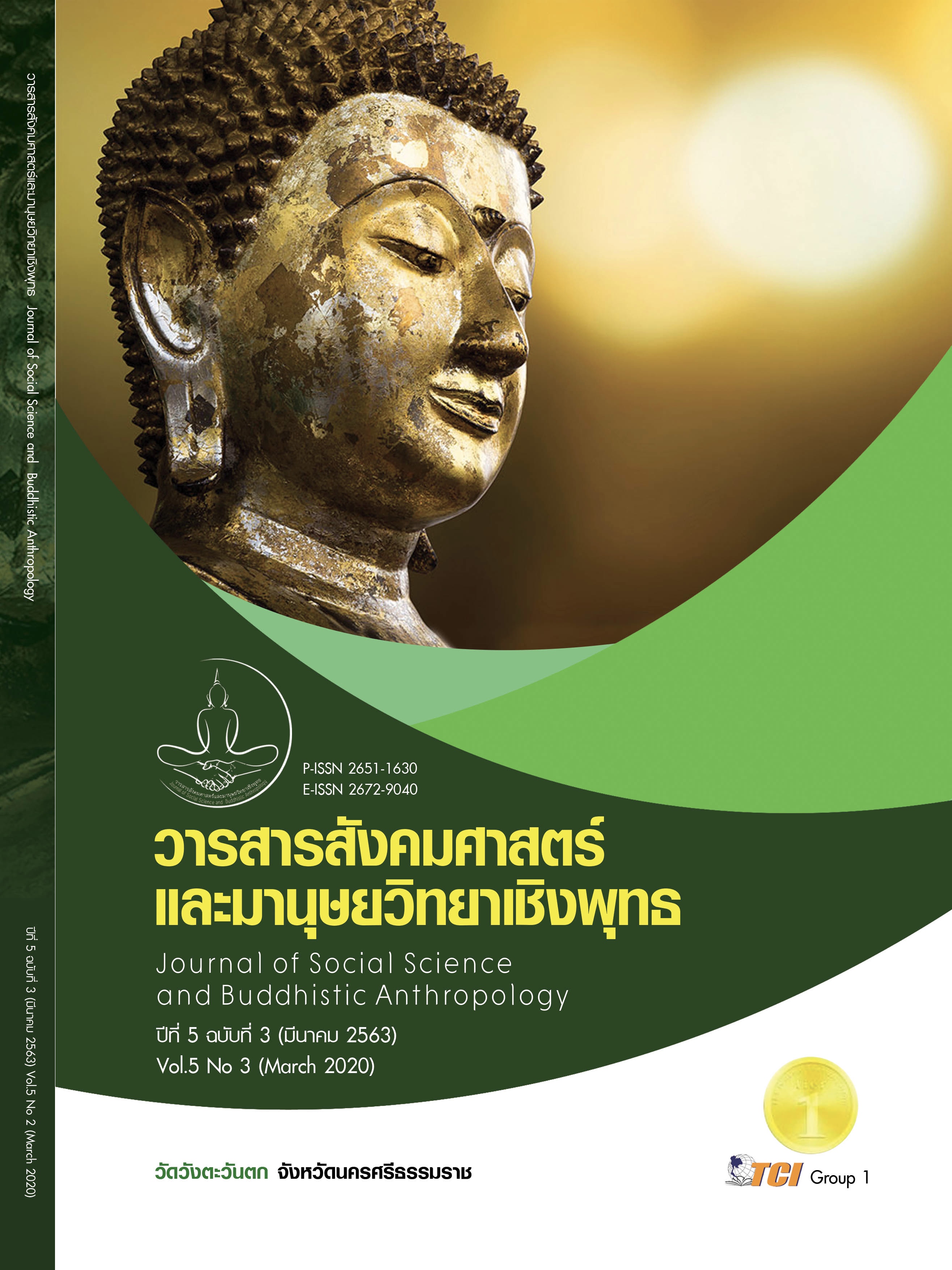A BUDDHIST PSYCHOLOGICAL SELF DEVELOPMENT MODEL FOR LEARNING ORGANIZATION
Keywords:
A Buddhist Psychological Self Development, States Of Conciliation, True Friends, Learning OrganizationAbstract
The objectives of this thematic paper were as follows: 1) to study Buddhist principle and positive psychology in self-development for learning organization, 2) to create the model of a buddhist psychological self-development model for learning organization. and 3) to determine exactly and present a buddhist psychological self-development model for learning organization. It was a mixed method research using quantitative method expanding to qualitative method. The key informants were the Buddhism experts, Psychologist, total 12 experts, selected by purposive sampling method with the sampling group of 405 samples. Qualitative data were analyzed by using content analysis and analytic induction. Quantitative data were analyzed using descriptive statistics and correlation, and to validate model with the empirical data using LISREL program. Research results were shown as follows:
Direct effects to it was found that states of conciliation got the direct effect from a buddhist psychological self development and true friends with the value of .60 and .35 were significant at the .01 level. States of conciliation also got the indirect effects from true friends with the value of .18 was significant at the .01 level. True friends got the direct effect from a buddhist psychological self development with the value of .51 was significant at the .01 level. And learning organization got the direct effect from a buddhist psychological self development with the value of .16 was significant at the .05 level. And got the direct effect from states of conciliation, true friends with the value of .33 and .46 were significant at the .01 level. And learning organization also got the indirect effect form a buddhist psychological self development influcenced by states of conciliation and true friend with the value of .49 and .12 were significant at the .01 level.
References
กัญญาภัค เฮงใจบุญ. (2555). การวิเคราะห์ปัจจัยเชิงสาเหตุที่มีอิทธิพลต่อการเป็นองค์การแห่งการเรียนรู้ของสถานศึกษาขั้นพื้นฐาน สังกัดสำนักงานเขตพื้นที่การศึกษาประถมศึกษา. วารสารวิชาการมหาวิทยาลัยอีสเทิร์นเอเชีย ฉบับสังคมศาสตร์และมนุษยศาสตร์, 4(2), 53-62.
ณัฐวุฒิ อรินทร์. (2555). การศึกษาปัจจัยเชิงเหตุและผลของทุนจิตวิทยาเชิงบวกที่มีต่อสุขภาวะทางจิตและพฤติกรรมการปฏิบัติงานภายใต้สถานการณ์ความไม่สงบของบุคลากรสาธารณสุขในจังหวัดชายแดนภาคใต้. ใน ดุษฎีนิพนธ์วิทยาศาสตรดุษฎีบัณฑิต สาขาการวิจัยพฤติกรรมศาสตร์ประยุกต์. มหาวิทยาลัยศรีนครินทรวิโรฒ.
ธัญญภัสร์ ศิรธัชนราโรจน์. (2559). จิตวิทยากับการพัฒนาตน. กรุงเทพมหานคร: โรงพิมพ์แห่งจุฬาลงกรณ์มหาวิทยาลัย.
พระครูพิมล ปัญญานุยุต. (2557). กระบวนการพัฒนาตนตามหลักพุทธจติวิทยาเพื่อการตื่นรู้. ใน ดุษฎีนิพนธ์พุทศาสตรดุษฎีบัณฑิต สาขาวิชาพุทธจิตวิทยา. มหาวิทยาลัยมหาจุฬาลงกรณราชวิทยาลัย.
พระพรหมคุณาภรณ์ (ป.อ. ปยุตโต). (2555). พุทธธรรมฉบับปรับขยาย. (พิมพ์ครั้งที่ 35). กรุงเทพมหานคร: ผลิธัมม์.
พระมหาไสว สนฺตมโน. (2556). การศึกษาเปรียบเทียบการคบมิตรในพระพุทธศาสนาเถรวาทกับศาสนาพราหมณ์ – ฮินดู. ใน วิทยานิพนธ์พุทธศาสตรมหาบัณฑิต สาขาวิชาศาสนาเปรียบเทียบ. มหาวิทยาลัยมหาจุฬาลงกรณราชวิทยาลัย.
พุทธทาสภิกขุ. (2538). พุทธประวัติ ฉบับสำหรับยุวชน. กรุงเทพมหานคร: สำนักพิมพ์ธรรมสภา.
มหาจุฬาลงกรณราชวิทยาลัย. (2539). พระไตรปิฎกภาษาไทย ฉบับมหาจุฬาลงกรณราชวิทยาลัย. กรุงเทพมหานคร: โรงพิมพ์มหาจุฬาลงกรณราชวิทยาลัย.
ลำพอง กลมกูล. (2554). อิทธิพลของกระบวนการสะท้อนคิดต่อประสิทธิผลการปฎิบัติการในชั้นเรียน : การวิจัยแบบผสมวิธี. ใน ดุษฎีนิพนธ์ครุศาสตรดุษฎีบัณฑิต ภาควิชาวิจัยและจิตวิทยาการศึกษา. จุฬาลงกรณมหาวิทยาลัย.
ศิริพร ทัศนศรี. (2557). การพัฒนาตนเองเชิงพุทธศาสตร์ของผู้บริหารสถานศึกษาอาชีวเอกชน. ใน ดุษฎีนิพนธ์พุทธศาสตรดุษฎีบัณฑิต สาขาวิชาพุทธบริหารการศึกษา. มหาวิทยาลัยมหาจุฬาลงกรณราชวิทยาลัย.
Compton, W.C., & Hoffman, E. (2013). Positive Psychology The Science of Happiness and Flourishing. U.S.A: WADSWORTH CENGAGE Learning.
Hair, J. F. et al. (1998). Multivariate data anlysis. (5th ed). New Jersey: Prentice Hall.
Luthans, F. et al. (2007). Psychological capital: Developing the human competitive edge. Oxford: Oxford University Press.









